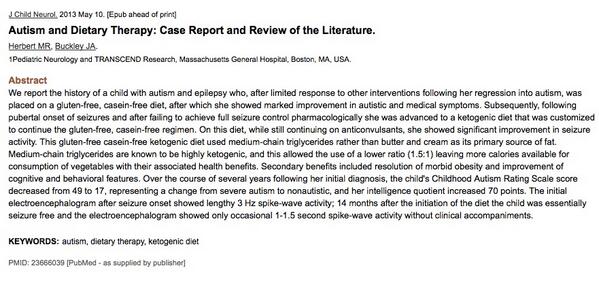http://www.eurekalert.org/pub_releases/2013-01/niom-sdt011413.php
Public release date: 15-Jan-2013
NIH/National Institute of Mental Health
Study documents that some children lose autism diagnosis
Small group with confirmed autism now on par with mainstream peers -- NIH-funded study
Some children who are accurately diagnosed in early childhood with autism lose the symptoms and the diagnosis as they grow older, a study supported by the National Institutes of Health has confirmed. The research team made the finding by carefully documenting a prior diagnosis of autism in a small group of school-age children and young adults with no current symptoms of the disorder.
The report is the first of a series that will probe more deeply into the nature of the change in these children's status. Having been diagnosed at one time with an autism spectrum disorder (ASD), these young people now appear to be on par with typically developing peers. The study team is continuing to analyze data on changes in brain function in these children and whether they have subtle residual social deficits. The team is also reviewing records on the types of interventions the children received, and to what extent they may have played a role in the transition.
"Although the diagnosis of autism is not usually lost over time, the findings suggest that there is a very wide range of possible outcomes," said NIMH Director Thomas R. Insel, M.D. "For an individual child, the outcome may be knowable only with time and after some years of intervention. Subsequent reports from this study should tell us more about the nature of autism and the role of therapy and other factors in the long term outcome for these children."
The study, led by Deborah Fein, Ph.D., at the University of Connecticut, Storrs, recruited 34 optimal outcome children, who had received a diagnosis of autism in early life and were now reportedly functioning no differently than their mainstream peers. For comparison, the 34 children were matched by age, sex, and nonverbal IQ with 44 children with high-functioning autism, and 34 typically developing peers. Participants ranged in age from 8 to 21 years old.
<>
Link from:
https://www.facebook.com/TheAutismRevolution
Retweeted by Autism Revolution
Healthy U NOW @HUNFoundation May 15
New detailed article on diet and autism in Journal of Child Neurology- by Drs. Martha Herbert and Julie Buckley!
http://pic.twitter.com/2poXsb3TIJ
[img]

[/img]
Bias, much?
 [/img]
[/img]